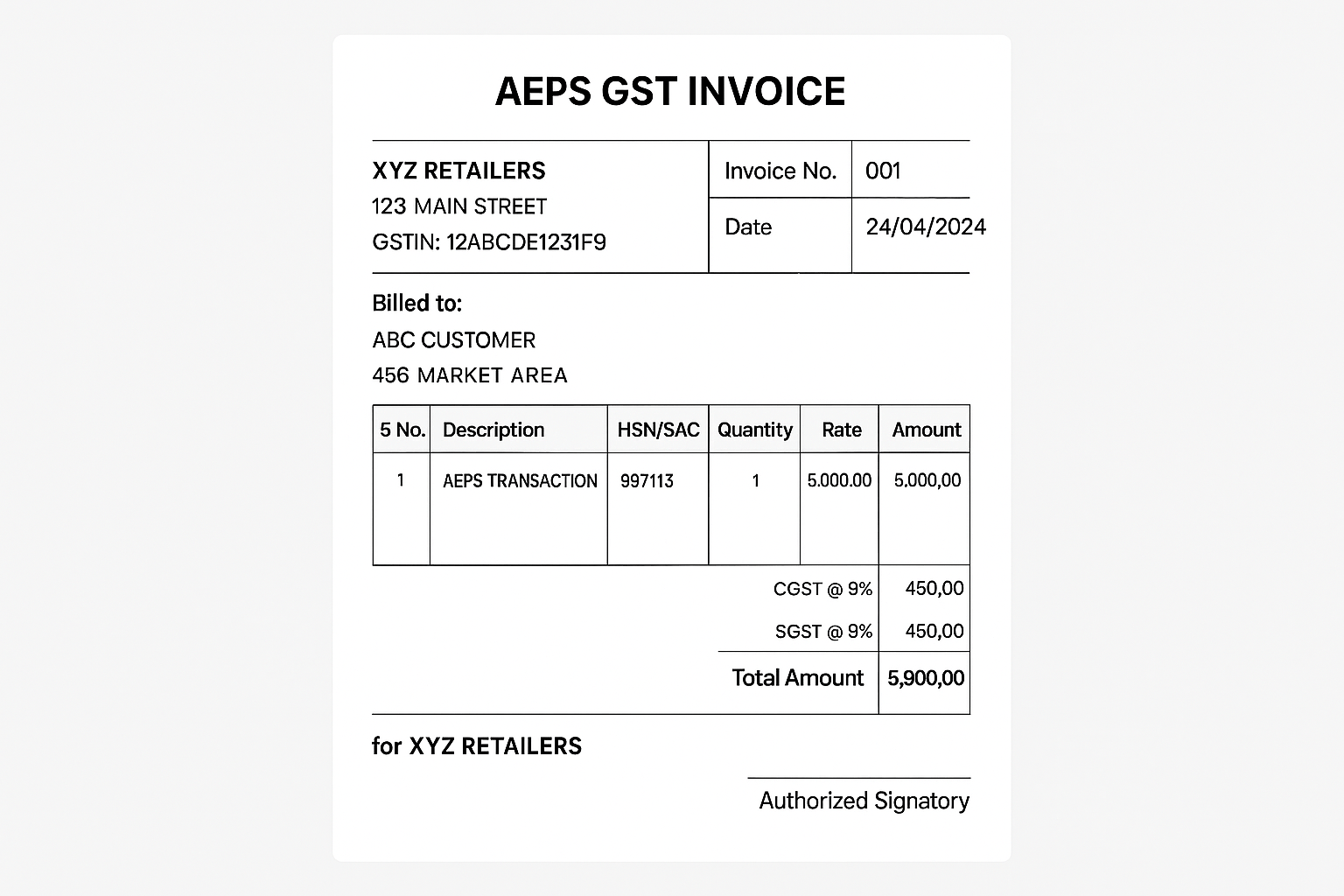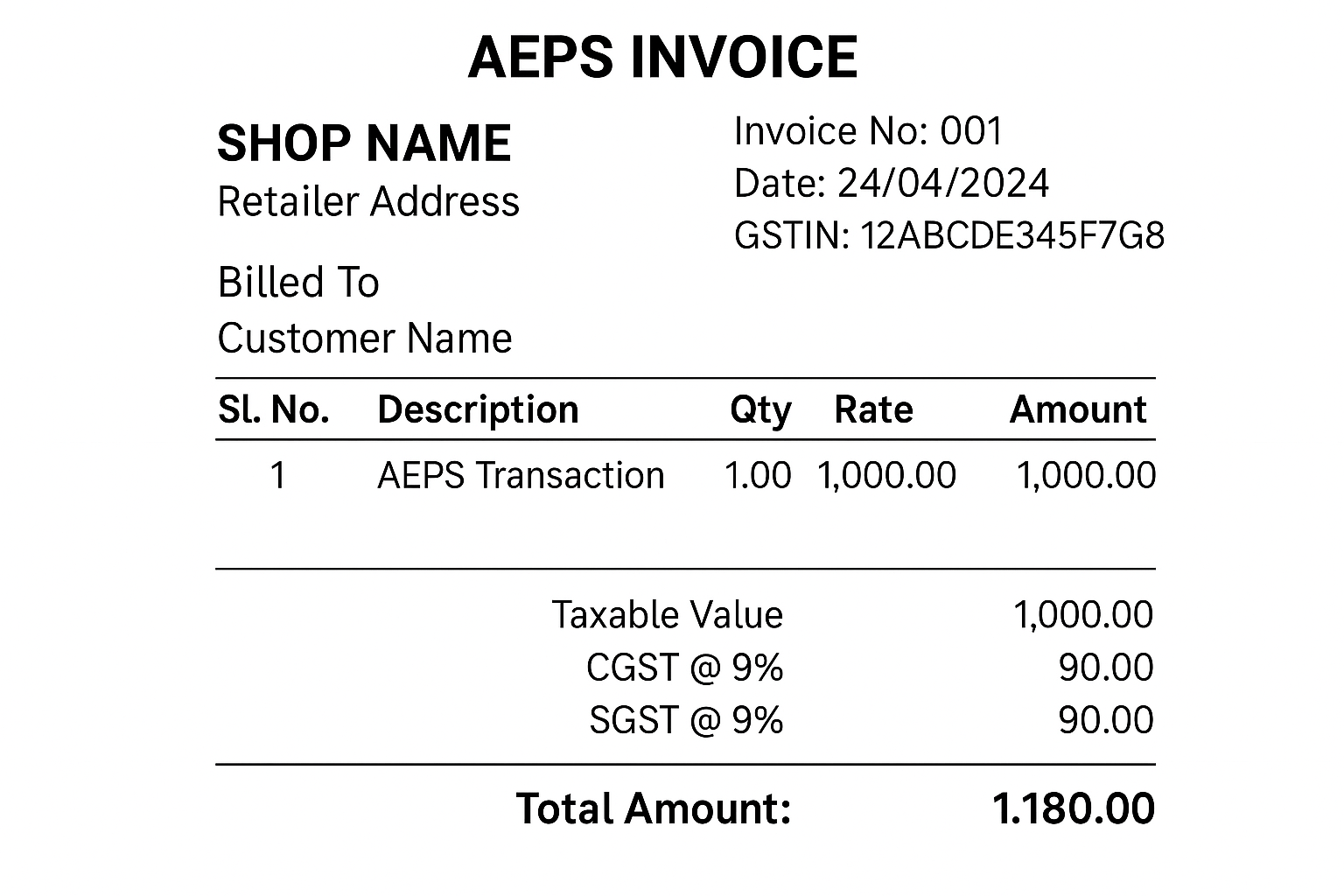Generating an AEPS GST invoice is essential for retailers who use Aadhaar Enabled Payment System (AEPS) transactions and need to comply with GST regulations. Whether you’re a small shop owner or a large retailer, creating accurate invoices ensures smooth business operations and avoids legal complications.
In this guide, we’ll break down the process step by step, explain key requirements, and provide practical tips to help you generate AEPS GST invoices correctly.
What is an AEPS GST Invoice?
An AEPS GST invoice is a legal document issued by retailers when processing transactions through the Aadhaar Enabled Payment System (AEPS). Since AEPS transactions involve financial exchanges, they must comply with GST rules if your business is GST-registered.
Key Components of an AEPS GST Invoice
-
Retailer & Customer Details – Business name, GSTIN, address, and customer details (if applicable).
-
Invoice Number & Date – A unique serial number and the transaction date.
-
AEPS Transaction Details – Aadhaar number (masked), bank reference ID, and transaction amount.
-
GST Breakdown – Applicable tax rates (CGST, SGST, IGST) and total taxable value.
-
Digital Signature (if required) – Some businesses use digital signatures for authenticity.

Step-by-Step Guide to Generate an AEPS GST Invoice
Step 1: Choose the Right Billing Software
Since AEPS transactions are digital, manual invoicing is inefficient. Use GST-compliant billing software like:
-
Tally.ERP 9
-
Zoho Books
-
QuickBooks GST
-
Custom AEPS-integrated POS systems
These tools auto-calculate GST and generate invoices seamlessly.
Step 2: Enter Transaction Details
After an AEPS transaction, log:
-
Transaction ID (from AEPS receipt)
-
Aadhaar-linked bank reference
-
Amount debited/credited
Step 3: Add GST Details
-
Check GST applicability – Not all AEPS transactions attract GST (e.g., cash withdrawals usually don’t).
-
Apply correct tax rates – If selling goods/services, use the right CGST/SGST or IGST rates.
Example:
-
Product Sold: Mobile accessory (₹500)
-
GST Rate: 18% (₹90 total tax)
-
Total Invoice Value: ₹590
Step 4: Generate & Share the Invoice
-
Print or email the invoice to the customer.
-
Store digitally for at least 6 years (GST compliance requirement).
Common Mistakes to Avoid
❌ Missing GSTIN – Always include your GST number if registered.
❌ Incorrect Tax Calculation – Double-check CGST/SGST splits.
❌ No AEPS Reference – Link the invoice to the AEPS transaction ID for audit trails.
Benefits of Proper AEPS GST Invoicing
✔ Legal Compliance – Avoids penalties for non-compliance.
✔ Smooth Audits – Maintains clear financial records.
✔ Customer Trust – Professional invoices enhance credibility.

Frequently Asked Questions (FAQs)
1. Is GST applicable on all AEPS transactions?
No, only on taxable goods/services. Cash withdrawals or balance checks are exempt.
2. Can I generate AEPS invoices manually?
Yes, but automated software reduces errors and saves time.
3. What if I don’t issue a GST invoice for AEPS transactions?
You may face fines or GST notice for non-compliance.
4. Do I need a digital signature for AEPS invoices?
Not mandatory, but recommended for high-value transactions.
Final Thoughts
Generating an AEPS GST invoice correctly ensures compliance and professionalism. By using the right tools and following GST guidelines, retailers can streamline transactions and avoid legal hassles.
Need help? Consult a GST expert or use AEPS-integrated billing software for hassle-free invoicing.
Disclaimer
This post is for educational purposes only. For specific GST advice, consult a tax professional. If you have any concerns regarding this content, please refer to our DMCA page for removal requests. Verify ownership or legal issues before taking action.
